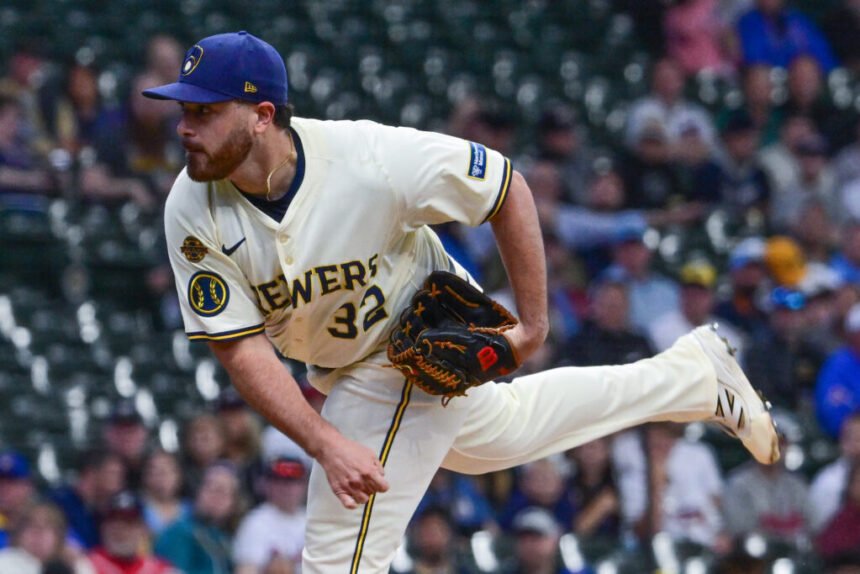The Brewers plan to move right-hander Aaron Civale from the rotation to the bullpen now that top prospect Jacob Misiorowski has been promoted for his major league debut, manager Pat Murphy tells the team’s beat (link via Adam McCalvy of MLB.com).
It’s a tough shift for Civale, a pending free agent who’s been pitching well since returning from a seven-week stay on the injured list due to a hamstring strain. The 29-year-old righty — 30 tomorrow — has tossed 19 innings with a 3.32 ERA and 17-to-6 K/BB ratio since being reinstated on May 22. The results have been solid, though it bears mentioning that Civale hasn’t exactly been efficient. He’s yet to pitch more than 5 1/3 innings in a start and was lifted from his most recent appearance after 80 pitches in 4 2/3 frames.
Even still, Civale’s first appearance in relief with the Brewers will be the first relief outing of his entire professional career. Since being selected by Cleveland in the third round of the 2016 draft, he’s pitched in 86 minor league games and 122 major league contests. Every single one of them has been a start. Between that history as a starter, Civale’s broader track record of big league success and his run of solid results since returning from the injured list, the move surely comes as a surprise to the righty. Murphy conceded that Civale was “not happy” when informed of the decision.
Milwaukee bought low on Civale just under 11 months ago, sending minor league infielder Gregory Barrios to the Rays in an early July swap to acquire him. At the time of the trade, Civale had limped to an ERA north of 5.00, but he righted the ship with the Brewers and pitched to a 3.53 ERA in 14 starts with Milwaukee over the season’s final three months. Between that solid finish to his ’24 season and his first five starts in ’25, Civale touts a 3.84 earned run average with a 20.7% strikeout rate and 7.9% walk rate in 96 innings as a Brewer.
Civale has averaged only five innings per start, but Milwaukee tends to have quicker hooks on its starting pitchers than most organizations. Only the Marlins have allowed a pitcher to face hitters a third time less often than the Brewers in 2025 — and by a margin of only two batters (243 for Milwaukee to 241 for Miami). Dating back to last year, Milwaukee pitchers have the fourth-fewest instances of facing a batter for a third time within a game. Civale’s career splits the second and third trip through the order are virtually identical: opponents facing him a second time in a game have a .257/.307/.451 slash compared to .255/.310/.451 a third time. (In the Brewers’ and Rays’ defense, those splits were more pronounced in 2024.)
All of that is to say, some frustration from Civale is understandable. Starting games is all he’s known since being drafted, and he’s now being asked to change roles less than three months from free agency at a time when he’s not pitching poorly. However, as I noted when recently looking at Milwaukee’s sudden and surprising glut of starting pitching, some tough decisions were bound to be made.
This certainly falls under that category. The team surely does not take lightly the fact that a move to the bullpen could have real ramifications on Civale’s earning power on the open market, but the alternatives would have been burning Quinn Priester’s final option year (at a time when he’s also pitching well) or optioning Chad Patrick — one of the NL Rookie of the Year frontrunners. Milwaukee could also have kept Misiorowski in Triple-A, but he’s pitched a 2.13 ERA there this season, including a 1.81 mark with a 33.5% strikeout rate over his past nine starts. Command is an issue — he’s walked 10.8% of opponents in that stretch, including nine in his past seven innings — but Misiorowski’s results and ability to miss bats generally seem worthy of a big league look.
Any mention of a veteran player being unhappy with a role change is going to prompt speculation about a trade — particularly when he’s affordable and playing on an expiring contract. Milwaukee would likely have gotten interest in Civale (and teammates Jose Quintana and Freddy Peralta) for those reasons anyhow, however, and there’s no indication that Civale has asked or will ask for a trade — frustration notwithstanding. Given the frequency of pitching injuries and the unconventional manner in which the Brewers tend to deploy their pitching staff, it wouldn’t be all that surprising if Civale found himself back in the rotation before long.
Today’s news and his manager’s willingness to concede some frustration on the player’s behalf do perhaps nominally increase the likelihood of an eventual trade. That said, one need only look at the Brewers’ deadline dealings over the years and the current state of their pitching staff to realize that a Civale trade was already a distinct possibility regardless.









